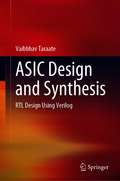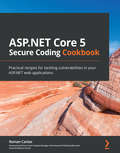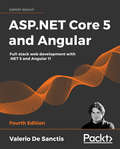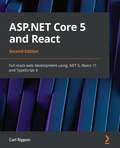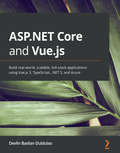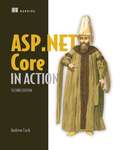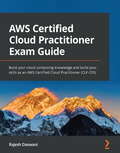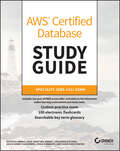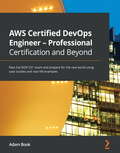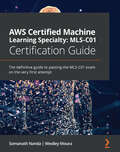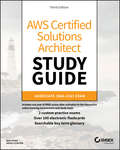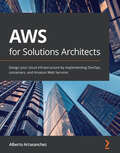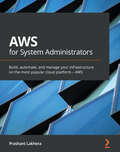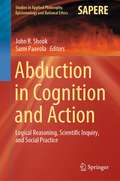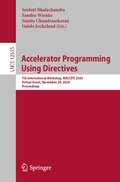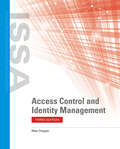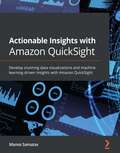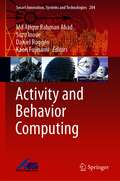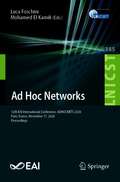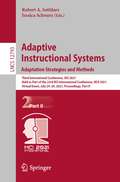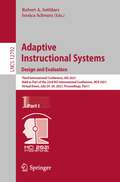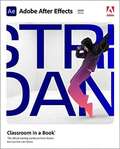- Table View
- List View
ASIC Design and Synthesis: RTL Design Using Verilog
by Vaibbhav TaraateThis book describes simple to complex ASIC design practical scenarios using Verilog. It builds a story from the basic fundamentals of ASIC designs to advanced RTL design concepts using Verilog. Looking at current trends of miniaturization, the contents provide practical information on the issues in ASIC design and synthesis using Synopsys DC and their solution. The book explains how to write efficient RTL using Verilog and how to improve design performance. It also covers architecture design strategies, multiple clock domain designs, low-power design techniques, DFT, pre-layout STA and the overall ASIC design flow with case studies. The contents of this book will be useful to practicing hardware engineers, students, and hobbyists looking to learn about ASIC design and synthesis.
ASP.NET Core 5 Secure Coding Cookbook: Practical recipes for tackling vulnerabilities in your ASP.NET web applications
by Roman CanlasLearn how to secure your ASP.NET Core web app through robust and secure codeKey FeaturesDiscover the different types of security weaknesses in ASP.NET Core web applications and learn how to fix themUnderstand what code makes an ASP.NET Core web app unsafeBuild your secure coding knowledge by following straightforward recipesBook DescriptionASP.NET Core developers are often presented with security test results showing the vulnerabilities found in their web apps. While the report may provide some high-level fix suggestions, it does not specify the exact steps that you need to take to resolve or fix weaknesses discovered by these tests. In ASP.NET Secure Coding Cookbook, you'll start by learning the fundamental concepts of secure coding and then gradually progress to identifying common web app vulnerabilities in code. As you progress, you'll cover recipes for fixing security misconfigurations in ASP.NET Core web apps. The book further demonstrates how you can resolve different types of Cross-Site Scripting. A dedicated section also takes you through fixing miscellaneous vulnerabilities that are no longer in the OWASP Top 10 list. This book features a recipe-style format, with each recipe containing sample unsecure code that presents the problem and corresponding solutions to eliminate the security bug. You'll be able to follow along with each step of the exercise and use the accompanying sample ASP.NET Core solution to practice writing secure code. By the end of this book, you'll be able to identify unsecure code causing different security flaws in ASP.NET Core web apps and you'll have gained hands-on experience in removing vulnerabilities and security defects from your code.What you will learnUnderstand techniques for squashing an ASP.NET Core web app security bugDiscover different types of injection attacks and understand how you can prevent this vulnerability from being exploitedFix security issues in code relating to broken authentication and authorizationEliminate the risks of sensitive data exposure by getting up to speed with numerous protection techniquesPrevent security misconfiguration by enabling ASP.NET Core web application security featuresExplore other ASP.NET web application vulnerabilities and secure coding best practicesWho this book is forThis ASP.NET Core book is for intermediate-level ASP.NET Core web developers and software engineers who use the framework to develop web applications and are looking to focus on their security using coding best practices. The book is also for application security engineers, analysts, and specialists who want to know more about securing ASP.NET Core using code and understand how to resolve issues identified by the security tests they perform daily.
ASP.NET Core 5 and Angular: Full-stack web development with .NET 5 and Angular 11, 4th Edition
by Valerio De SanctisBuild a simple, yet fully functional modern web application using .NET 5, Entity Framework Core, and Angular 11Key FeaturesComprehensively updated with the latest features and additions in ASP.NET Core 5 and Angular 11Design, build, and deploy a Single Page Application or Progressive Web App with ASP.NET Core and AngularAdopt a full stack approach to handle data management, Web APIs, application design, testing, SEO, security, and deploymentBook DescriptionLearning full-stack development calls for knowledge of both front-end and back-end web development. ASP.NET Core 5 and Angular, Fourth Edition will get you started with Angular to build robust web applications as well as the ASP.NET Core 5 and Web API Controllers to implement API calls and server-side routing in the back-end. This fully revised edition includes a side-by-side comparison of the Visual Studio Angular app versus NG App and coverage of the Angular routing module. You will learn how to build a data model with Entity Framework Core, alongside utilizing the Entity Core Fluent API and EntityTypeConfiguration class. As you progress, you will learn how to handle user input with Angular reactive forms and front-end and back-end validators for maximum effect. You will later explore the advanced debugging and unit testing features provided by xUnit.net (.NET 5) and Jasmine, as well as Karma for Angular. Further, you will dive deep into progressive web applications (PWAs), learning about their technical requirements, testing, and converting SWAs to PWAs. Finally, you will learn how to deploy apps on Windows, Linux, and Azure using IIS, Kestrel, and nginx. By the end of this book, you will be equipped with the skills you need to create, debug, and deploy efficient web applications using ASP.NET Core and Angular.What you will learnImplement a Web API interface with ASP.NET Core and consume it with Angular using RxJS ObservablesSet up a SQL database server using a local instance or a cloud data storePerform C# and TypeScript debugging using Visual Studio 2019Create TDD and BDD unit tests using xUnit, Jasmine, and KarmaExplore the EF Core Fluent API and EntityTypeConfiguration classesPerform DBMS structured logging using third-party providers such as SeriLogDeploy a Web application to Windows and Linux web servers, or to cloud-based PaaS solutions such as Azure App ServiceWho this book is forThis book is for experienced ASP.NET developers who already possess some experience with ASP.NET Core and Angular and are looking to learn how to use them together to create production-ready Single Page Applications (SPAs) or Progressive Web Applications (PWAs).However, the fully documented code samples (also available on GitHub) and the step-by-step implementation tutorials make this book easy-to-understand - even for beginners.
ASP.NET Core 5 and React: Full-stack web development using .NET 5, React 17, and TypeScript 4, 2nd Edition
by Carl RipponBuild fully functional, cloud-ready, and professional web applications using the latest features in the .NET 5 framework and React.js with Microsoft AzureKey FeaturesExplore the new features of .NET 5 with this updated edition of ASP.NET Core 53 and ReactDiscover strategies for adopting a full-stack development approach, clean architecture techniques, and development best practicesLearn how to manage data, design and package applications, and secure your web appsBook DescriptionMicrosoft's .NET framework is a robust server-side framework, now even more powerful thanks to the recent unification of the Microsoft ecosystem with the .NET 5 framework. This updated second edition addresses these changes in the .NET framework and the latest release of React. The book starts by taking you through React and TypeScript components for building an intuitive single-page application and then shows you how to design scalable REST APIs that can integrate with a React-based frontend. Next, you'll get to grips with the latest features, popular patterns, and tools available in the React ecosystem, including function-based components, React Router, and Redux. As you progress through the chapters, you'll learn how to use React with TypeScript to make the frontend robust and maintainable and cover key ASP.NET 5 features such as API controllers, attribute routing, and model binding to build a sturdy backend. In addition to this, you'll explore API security with ASP.NET 5 identity and authorization policies and write reliable unit tests using both .NET and React, before deploying your app on Azure. By the end of this book, you'll have gained the knowledge you need to enhance your C# and JavaScript skills and build full-stack, production-ready applications with ASP.NET 5 and React.What you will learnBuild RESTful APIs with .NET 5 using API controllersSecure REST APIs with identity and authorization policiesCreate strongly typed, interactive, and function-based React components using HooksUnderstand how to style React components using Emotion.jsPerform client-side state management with ReduxRun a range of automated tests on the frontend and backendImplement continuous integration and continuous delivery (CI/CD) processes in Azure using Azure DevOpsWho this book is forIf you're a web developer looking to get up to speed with full-stack web application development with .NET Core and React, this book is for you. Although the book does not assume any knowledge of React, a basic understanding of .NET Core will help you to get to grips with the concepts covered.
ASP.NET Core and Vue.js: Build real-world, scalable, full-stack applications using Vue.js 3, TypeScript, .NET 5, and Azure
by Devlin Basilan DuldulaoA guide to building enterprise, cloud-ready full-stack web applications using TypeScript, Vue.js 3, and ASP.NET Core 5 for busy developersKey FeaturesLearn how to implement clean architecture in the latest ASP.NET Core 5 Web APIDevelop Vue.js 3 single-page applications (SPAs) using TypeScript or JavaScript programming and Vuex state managementSecure, test, and deploy your full-stack web application to Azure CloudBook DescriptionVue.js 3 is faster and smaller than the previous version, and TypeScript's full support out of the box makes it a more maintainable and easier-to-use version of Vue.js. Then, there's ASP.NET Core 5, which is the fastest .NET web framework today. Together, Vue.js for the frontend and ASP.NET Core 5 for the backend make a powerful combination. This book follows a hands-on approach to implementing practical methodologies for building robust applications using ASP.NET Core 5 and Vue.js 3. The topics here are not deep dive and the book is intended for busy .NET developers who have limited time and want a quick implementation of a clean architecture with popular libraries. You'll start by setting up your web app's backend, guided by clean architecture, command query responsibility segregation (CQRS), mediator pattern, and Entity Framework Core 5. The book then shows you how to build the frontend application using best practices, state management with Vuex, Vuetify UI component libraries, Vuelidate for input validations, lazy loading with Vue Router, and JWT authentication. Later, you'll focus on testing and deployment. All the tutorials in this book support Windows 10, macOS, and Linux users. By the end of this book, you'll be able to build an enterprise full-stack web app, use the most common npm packages for Vue.js and NuGet packages for ASP.NET Core, and deploy Vue.js and ASP.NET Core to Azure App Service using GitHub Actions.What you will learnDiscover CQRS and mediator pattern in the ASP.NET Core 5 Web APIUse Serilog, MediatR, FluentValidation, and Redis in ASP.NETExplore common Vue.js packages such as Vuelidate, Vuetify, and VuexManage complex app states using the Vuex state management libraryWrite integration tests in ASP.NET Core using xUnit and FluentAssertionsDeploy your app to Microsoft Azure using the new GitHub Actions for continuous integration and continuous deployment (CI/CD)Who this book is forThis app development book is for .NET developers who want to get started with Vue.js and build full-stack real-world enterprise web applications. Developers looking to build a proof-of-concept application quickly and pragmatically using their existing knowledge of ASP.NET Core as well as developers who want to write readable and maintainable code using TypeScript and the C# programming language will also find this book useful. The book assumes intermediate-level .NET knowledge along with an understanding of C# programming, JavaScript, and ECMAScript.
ASP.NET Core in Action
by Andrew LockASP.NET Core in Action, Second Edition is a comprehensive guide to creating web applications with ASP.NET Core 5.0. Go from basic HTTP concepts to advanced framework customization.Summary Fully updated to ASP.NET 5.0, ASP.NET Core in Action, Second Edition is a hands-on primer to building cross-platform web applications with your C# and .NET skills. Even if you've never worked with ASP.NET you'll start creating productive cross-platform web apps fast. And don&’t worry about late-breaking changes to ASP.NET Core. Purchase of the print book includes a free eBook in PDF, Kindle, and ePub formats from Manning Publications. About the technology Build full-stack web applications that run anywhere. Developers love ASP.NET Core for its libraries and pre-built components that maximize productivity. Version 5.0 offers new features for server-side apps, as well as background services for cross-platform development. About the book ASP.NET Core in Action, Second Edition is a comprehensive guide to creating web applications with ASP.NET Core 5.0. Go from basic HTTP concepts to advanced framework customization. Illustrations and annotated code make learning visual and easy. Master logins, dependency injection, security, and more. This updated edition covers the latest features, including Razor Pages and the new hosting paradigm. What's inside Developing apps for Windows and non-Windows servers Configuring applications Building custom components Logging, testing, and security About the reader For intermediate C# developers. About the author Andrew Lock is a Microsoft MVP who has worked with ASP.NET Core since before its first release. Table of Contents PART 1 - GETTING STARTED WITH ASP.NET CORE 1 Getting started with ASP.NET Core 2 Your first application 3 Handling requests with the middleware pipeline 4 Creating a website with Razor Pages 5 Mapping URLs to Razor Pages using routing 6 The binding model: Retrieving and validating user input 7 Rendering HTML using Razor views 8 Building forms with Tag Helpers 9 Creating a Web API for mobile and client applications using MVC PART 2 - BUILDING COMPLETE APPLICATIONS 10 Service configuration with dependency injection 11 Configuring an ASP.NET Core application 12 Saving data with Entity Framework Core 13 The MVC and Razor Pages filter pipeline 14 Authentication: Adding users to your application with Identity 15 Authorization: Securing your application 16 Publishing and deploying your application PART 3 - EXTENDING YOUR APPLICATIONS 17 Monitoring and troubleshooting errors with logging 18 Improving your application&’s security 19 Building custom components 20 Building custom MVC and Razor Pages components 21 Calling remote APIs with IHttpClientFactory 22 Building background tasks and services 23 Testing your application
ATLAS Measurements of the Higgs Boson Coupling to the Top Quark in the Higgs to Diphoton Decay Channel (Springer Theses)
by Jennet Elizabeth DickinsonDuring Run 2 of the Large Hadron Collider, the ATLAS experiment recorded proton-proton collision events at 13 TeV, the highest energy ever achieved in a collider. Analysis of this dataset has provided new opportunities for precision measurements of the Higgs boson, including its interaction with the top quark. The Higgs-top coupling can be directly probed through the production of a Higgs boson in association with a top-antitop quark pair (ttH). The Higgs to diphoton decay channel is among the most sensitive for ttH measurements due to the excellent diphoton mass resolution of the ATLAS detector and the clean signature of this decay. Event selection criteria were developed using novel Machine Learning techniques to target ttH events, yielding a precise measurement of the ttH cross section in the diphoton channel and a 6.3 $\sigma$ observation of the ttH process in combination with other decay channels, as well as stringent limits on CP violation in the Higgs-top coupling.
AWS Certified Cloud Practitioner Exam Guide: Build your cloud computing knowledge and build your skills as an AWS Certified Cloud Practitioner (CLF-C01)
by Rajesh DaswaniDevelop proficiency in AWS technologies and validate your skills by becoming an AWS Certified Cloud PractitionerKey FeaturesDevelop the skills to design highly available and fault-tolerant solutions in the cloudLearn how to adopt best-practice security measures in your cloud applicationsAchieve credibility through industry-recognized AWS Cloud Practitioner certificationBook DescriptionAmazon Web Services is the largest cloud computing service provider in the world. Its foundational certification, AWS Certified Cloud Practitioner (CLF-C01), is the first step to fast-tracking your career in cloud computing. This certification will add value even to those in non-IT roles, including professionals from sales, legal, and finance who may be working with cloud computing or AWS projects. If you are a seasoned IT professional, this certification will make it easier for you to prepare for more technical certifications to progress up the AWS ladder and improve your career prospects.The book is divided into four parts. The first part focuses on the fundamentals of cloud computing and the AWS global infrastructure. The second part examines key AWS technology services, including compute, network, storage, and database services. The third part covers AWS security, the shared responsibility model, and several security tools. In the final part, you'll study the fundamentals of cloud economics and AWS pricing models and billing practices.Complete with exercises that highlight best practices for designing solutions, detailed use cases for each of the AWS services, quizzes, and two complete practice tests, this CLF-C01 exam study guide will help you gain the knowledge and hands-on experience necessary to ace the AWS Certified Cloud Practitioner exam.What you will learnCreate an AWS account to access AWS cloud services in a secure and isolated environmentUnderstand identity and access management (IAM), encryption, and multifactor authentication (MFA) protectionConfigure multifactor authentication for your IAM accountsConfigure AWS services such as EC2, ECS, Lambda, VPCs, and Route53Explore various storage and database services such as S3, EBS, and Amazon RDSStudy the fundamentals of modern application design to shift from a monolithic to microservices architectureDesign highly available solutions with decoupling ingrained in your design architectureWho this book is forIf you're looking to advance your career and gain expertise in cloud computing, with particular focus on the AWS platform, this book is for you. This guide will help you ace the AWS Certified Cloud Practitioner Certification exam, enabling you to embark on a rewarding career in cloud computing. No previous IT experience is essential to get started with this book, since it covers core IT fundamentals from the ground up.
AWS Certified Database Study Guide: Specialty (DBS-C01) Exam
by Matheus Arrais Rene Martinez Bravet Leonardo Ciccone Angie Nobre Cocharero Erika Kurauchi Hugo RozestratenValidate your AWS Cloud database skills! AWS Certified Database Study Guide: Specialty (DBS-C01) Exam focuses on helping you to understand the basic job role of a database administrator / architect and to prepare for taking the certification exam. This is your opportunity to take the next step in your career by expanding and validating your skills on the AWS Cloud, and performing a database-focused role. AWS is the frontrunner in cloud computing products and services, and this study guide will help you to gain an understanding of core AWS services, uses, and basic AWS database design and deployment best practices. AWS offers more than relational and nonrelation databases, they offer purpose built databases, which allow you to utilize database services prebuilt to meet your business requirements. If you are looking to take the Specialty (DBS-C01) exam, this Study Guide is what you need for comprehensive content and robust study tools that will help you gain the edge on exam day and throughout your career. AWS Certified Database certification offers a great way for IT professionals to achieve industry recognition as cloud experts. This new study guide is perfect for you if you perform a database-focused role and want to pass the DBS-C01 exam to prove your knowledge of how to design and deploy secure and robust database applications on AWS technologies. IT cloud professionals who hold AWS certifications are in great demand, and this certification could take your career to the next level! Master all the key concepts you need to pass the AWS Certified Database Specialty (DBS-C01) Exam Further your career by demonstrating your cloud computing expertise and your knowledge of databases and database services Understand the concept of purpose built databases, allowing you to pick the right tool for the right job. Review deployment and migration, management and operations, monitoring and troubleshooting, database security, and more Access the Sybex online learning environment and test bank for interactive study aids and practice questionsReaders will also get one year of FREE access after activation to Sybex’s superior online interactive learning environment and test bank, including hundreds of questions, a practice exam, electronic flashcards, and a glossary of key terms.
AWS Certified DevOps Engineer - Professional Certification and Beyond: Pass the DOP-C01 exam and prepare for the real world using case studies and real-life examples
by Adam BookExplore the ins and outs of becoming an AWS certified DevOps professional engineer with the help of easy-to-follow practical examples and detailed explanationsKey FeaturesDiscover how to implement and manage continuous delivery systems and methodologies on AWSExplore real-world scenarios and hands-on examples that will prepare you to take the DOP-C01 exam with confidenceLearn from enterprise DevOps scenarios to prepare fully for the AWS certification examBook DescriptionThe AWS Certified DevOps Engineer certification is one of the highest AWS credentials, vastly recognized in cloud computing or software development industries. This book is an extensive guide to helping you strengthen your DevOps skills as you work with your AWS workloads on a day-to-day basis.You'll begin by learning how to create and deploy a workload using the AWS code suite of tools, and then move on to adding monitoring and fault tolerance to your workload. You'll explore enterprise scenarios that'll help you to understand various AWS tools and services. This book is packed with detailed explanations of essential concepts to help you get to grips with the domains needed to pass the DevOps professional exam. As you advance, you'll delve into AWS with the help of hands-on examples and practice questions to gain a holistic understanding of the services covered in the AWS DevOps professional exam. Throughout the book, you'll find real-world scenarios that you can easily incorporate in your daily activities when working with AWS, making you a valuable asset for any organization.By the end of this AWS certification book, you'll have gained the knowledge needed to pass the AWS Certified DevOps Engineer exam, and be able to implement different techniques for delivering each service in real-world scenarios.What you will learnAutomate your pipelines, build phases, and deployments with AWS-native toolingDiscover how to implement logging and monitoring using AWS-native toolingGain a solid understanding of the services included in the AWS DevOps Professional examReinforce security practices on the AWS platform from an exam point of viewFind out how to automatically enforce standards and policies in AWS environmentsExplore AWS best practices and anti-patternsEnhance your core AWS skills with the help of exercises and practice testsWho this book is forThis book is for AWS developers and SysOps administrators looking to advance their careers by achieving the highly sought-after DevOps Professional certification. Basic knowledge of AWS as well as its core services (EC2, S3, and RDS) is needed. Familiarity with DevOps concepts such as source control, monitoring, and logging, not necessarily in the AWS context, will be helpful.
AWS Certified Machine Learning Specialty: The definitive guide to passing the MLS-C01 exam on the very first attempt
by Somanath Nanda Weslley MouraPrepare to achieve AWS Machine Learning Specialty certification with this complete, up-to-date guide and take the exam with confidenceKey FeaturesGet to grips with core machine learning algorithms along with AWS implementationBuild model training and inference pipelines and deploy machine learning models to the Amazon Web Services (AWS) cloudLearn all about the AWS services available for machine learning in order to pass the MLS-C01 examBook DescriptionThe AWS Certified Machine Learning Specialty exam tests your competency to perform machine learning (ML) on AWS infrastructure. This book covers the entire exam syllabus using practical examples to help you with your real-world machine learning projects on AWS. Starting with an introduction to machine learning on AWS, you'll learn the fundamentals of machine learning and explore important AWS services for artificial intelligence (AI). You'll then see how to prepare data for machine learning and discover a wide variety of techniques for data manipulation and transformation for different types of variables. The book also shows you how to handle missing data and outliers and takes you through various machine learning tasks such as classification, regression, clustering, forecasting, anomaly detection, text mining, and image processing, along with the specific ML algorithms you need to know to pass the exam. Finally, you'll explore model evaluation, optimization, and deployment and get to grips with deploying models in a production environment and monitoring them. By the end of this book, you'll have gained knowledge of the key challenges in machine learning and the solutions that AWS has released for each of them, along with the tools, methods, and techniques commonly used in each domain of AWS ML.What you will learnUnderstand all four domains covered in the exam, along with types of questions, exam duration, and scoringBecome well-versed with machine learning terminologies, methodologies, frameworks, and the different AWS services for machine learningGet to grips with data preparation and using AWS services for batch and real-time data processingExplore the built-in machine learning algorithms in AWS and build and deploy your own modelsEvaluate machine learning models and tune hyperparametersDeploy machine learning models with the AWS infrastructureWho this book is forThis AWS book is for professionals and students who want to prepare for and pass the AWS Certified Machine Learning Specialty exam or gain deeper knowledge of machine learning with a special focus on AWS. Beginner-level knowledge of machine learning and AWS services is necessary before getting started with this book.
AWS Certified Solutions Architect Study Guide: Associate SAA-C02 Exam
by David Clinton Ben PiperMaster the intricacies of Amazon Web Services and efficiently prepare for the SAA-C02 Exam with this comprehensive study guide AWS Certified Solutions Study Guide: Associate (SAA-C02) Exam, Third Edition comprehensively and efficiently prepares you for the SAA-C02 Exam. The study guide contains robust and effective study tools that will help you succeed on the exam. The guide grants you access to the regularly updated Sybex online learning environment and test bank, which contains hundreds of test questions, bonus practice exams, electronic flashcards, and a glossary of key terms. In this study guide, accomplished and experienced authors Ben Piper and David Clinton show you how to: Design resilient architectures Create high-performing architectures Craft secure applications and architectures Design cost-optimized architectures Perfect for anyone who hopes to begin a new career as an Amazon Web Services cloud professional, the study guide also belongs on the bookshelf of any existing AWS professional who wants to brush up on the fundamentals of their profession.
AWS for Solutions Architects: Design your cloud infrastructure by implementing DevOps, containers, and Amazon Web Services
by Alberto ArtasanchezApply cloud design patterns to overcome real-world challenges by building scalable, secure, highly available, and cost-effective solutionsKey FeaturesApply AWS Well-Architected Framework concepts to common real-world use casesUnderstand how to select AWS patterns and architectures that are best suited to your needsEnsure the security and stability of a solution without impacting cost or performanceBook DescriptionOne of the most popular cloud platforms in the world, Amazon Web Services (AWS) offers hundreds of services with thousands of features to help you build scalable cloud solutions; however, it can be overwhelming to navigate the vast number of services and decide which ones best suit your requirements. Whether you are an application architect, enterprise architect, developer, or operations engineer, this book will take you through AWS architectural patterns and guide you in selecting the most appropriate services for your projects. AWS for Solutions Architects is a comprehensive guide that covers the essential concepts that you need to know for designing well-architected AWS solutions that solve the challenges organizations face daily. You'll get to grips with AWS architectural principles and patterns by implementing best practices and recommended techniques for real-world use cases. The book will show you how to enhance operational efficiency, security, reliability, performance, and cost-effectiveness using real-world examples. By the end of this AWS book, you'll have gained a clear understanding of how to design AWS architectures using the most appropriate services to meet your organization's technological and business requirements.What you will learnRationalize the selection of AWS as the right cloud provider for your organizationChoose the most appropriate service from AWS for a particular use case or projectImplement change and operations managementFind out the right resource type and size to balance performance and efficiencyDiscover how to mitigate risk and enforce security, authentication, and authorizationIdentify common business scenarios and select the right reference architectures for themWho this book is forThis book is for application and enterprise architects, developers, and operations engineers who want to become well-versed with AWS architectural patterns, best practices, and advanced techniques to build scalable, secure, highly available, and cost-effective solutions in the cloud. Although existing AWS users will find this book most useful, it will also help potential users understand how leveraging AWS can benefit their organization.
AWS for System Administrators: Build, automate, and manage your infrastructure on the most popular cloud platform – AWS
by Prashant LakheraTake your AWS skills to the next level by learning infrastructure automation techniques using CloudFormation, Terraform, and Boto3Key FeaturesExplore AWS automation using CloudFormation, Terraform, and Boto3Leverage AWS to make your infrastructure flexible and highly availableDiscover various AWS features for building a secure and reliable environment to host your applicationBook DescriptionAmazon Web Services (AWS) is one of the most popular and efficient cloud platforms for administering and deploying your applications to make them resilient and robust. AWS for System Administrators will help you to learn several advanced cloud administration concepts for deploying, managing, and operating highly available systems on AWS. Starting with the fundamentals of identity and access management (IAM) for securing your environment, this book will gradually take you through AWS networking and monitoring tools. As you make your way through the chapters, you'll get to grips with VPC, EC2, load balancer, Auto Scaling, RDS database, and data management. The book will also show you how to initiate AWS automated backups and store and keep track of log files. Later, you'll work with AWS APIs and understand how to use them along with CloudFormation, Python Boto3 Script, and Terraform to automate infrastructure. By the end of this AWS book, you'll be ready to build your two-tier startup with all the necessary infrastructure, monitoring, and logging components in place.What you will learnAdopt a security-first approach by giving users minimum access using IAM policiesBuild your first Amazon Elastic Compute Cloud (EC2) instance using the AWS CLI, Boto3, and TerraformSet up your datacenter in AWS Cloud using VPCScale your application based on demand using Auto ScalingMonitor services using CloudWatch and SNSWork with centralized logs for analysis (CloudWatch Logs)Back up your data using Amazon Simple Storage Service (Amazon S3), Data Lifecycle Manager, and AWS BackupWho this book is forThis Amazon Web Services book is for system administrators and solution architects who want to build highly available and flexible AWS Cloud platforms for their applications. Software engineers and programmers looking to deploy their applications to AWS Cloud will also find this book useful. Basic knowledge of Linux and AWS is necessary to get started.
AWS for System Administrators: Build, automate, and manage your infrastructure on the most popular cloud platform – AWS
by Prashant LakheraTake your AWS SysOps skills to the next level by learning infrastructure automation techniques using CloudFormation, Terraform, and Boto3Key FeaturesBook DescriptionAmazon Web Services (AWS) is one of the most popular and efficient cloud platforms for administering and deploying your applications to make them resilient and robust. AWS for System Administrators will help you to learn several advanced cloud administration concepts for deploying, managing, and operating highly available systems on AWS. Starting with the fundamentals of identity and access management (IAM) for securing your environment, this book will gradually take you through AWS networking and monitoring tools. As you make your way through the chapters, you’ll get to grips with VPC, EC2, load balancer, Auto Scaling, RDS database, and data management. The book will also show you how to initiate AWS automated backups and store and keep track of log files. Later, you’ll work with AWS APIs and understand how to use them along with CloudFormation, Python Boto3 Script, and Terraform to automate infrastructure. By the end of this AWS book, you’ll be ready to build your two-tier startup with all the necessary infrastructure, monitoring, and logging components in place.What you will learnAdopt a security-first approach by giving users minimum access using IAM policiesBuild your first Amazon Elastic Compute Cloud (EC2) instance using the AWS CLI, Boto3, and TerraformSet up your datacenter in AWS Cloud using VPCScale your application based on demand using Auto ScalingMonitor services using CloudWatch and SNSWork with centralized logs for analysis (CloudWatch Logs)Back up your data using Amazon Simple Storage Service (Amazon S3), Data Lifecycle Manager, and AWS BackupWho this book is forThis Amazon Web Services book is for system administrators and solution architects who want to build highly available and flexible AWS Cloud platforms for their applications. Software engineers and programmers looking to deploy their applications to AWS Cloud will also find this book useful. Basic knowledge of Linux and AWS is necessary to get started.
Abduction in Cognition and Action: Logical Reasoning, Scientific Inquiry, and Social Practice (Studies in Applied Philosophy, Epistemology and Rational Ethics #59)
by John R. Shook Sami PaavolaThis book gathers together novel essays on the state-of-the-art research into the logic and practice of abduction. In many ways, abduction has become established and essential to several fields, such as logic, cognitive science, artificial intelligence, philosophy of science, and methodology. In recent years this interest in abduction’s many aspects and functions has accelerated. There are evidently several different interpretations and uses for abduction. Many fundamental questions on abduction remain open. How is abduction manifested in human cognition and intelligence? What kinds or types of abduction can be discerned? What is the role for abduction in inquiry and mathematical discovery? The chapters aim at providing answer to these and other current questions. Their contributors have been at the forefront of discussions on abduction, and offer here their updated approaches to the issues that they consider central to abduction’s contemporary relevance. The book is an essential reading for any scholar or professional keeping up with disciplines impacted by the study of abductive reasoning, and its novel development and applications in various fields.
Absolute Essentials of Digital Marketing (Absolute Essentials of Business and Economics)
by Alan CharlesworthThis short form textbook provides readers with a comprehensive yet concise overview of the fundamentals of Digital Marketing. The author, a well-renowned teacher and writer on the subject, presents a concise and clear structure that works step by step through each of the core aspects of the subject, including SEO, metrics and analytics, web development, e-commerce, social media and digital marketing strategy. Presented in nine chapters to suit delivery periods at both undergraduate and postgraduate levels, this book can be used either as a core text that gives tutors a sound platform on which to structure a module on digital marketing or as supporting text where digital marketing is an element of a module with a broader scope, such as strategic marketing. Pedagogical features include an essential summary paragraph at the start of each chapter, focused references and further reading. There is also online teaching and learning support for both in-class and digital delivery, including suggested case studies, chapter questions and other activities.
Accelerator Programming Using Directives: 7th International Workshop, WACCPD 2020, Virtual Event, November 20, 2020, Proceedings (Lecture Notes in Computer Science #12655)
by Sunita Chandrasekaran Guido Juckeland Sandra Wienke Sridutt BhalachandraThis book constitutes the proceedings of the 7th International Workshop on Accelerator Programming Using Directives, WACCPD 2020, which took place on November 20, 2021. The workshop was initially planned to take place in Atlanta, GA, USA, and changed to an online format due to the COVID-19 pandemic.WACCPD is one of the major forums for bringing together users, developers, and the software and tools community to share knowledge and experiences when programming emerging complex parallel computing systems. The 5 papers presented in this volume were carefully reviewed and selected from 7 submissions. They were organized in topical sections named: OpenMP; OpenACC; and Domain-specific Solvers.
Access Control and Identity Management
by Mike ChappleRevised and updated with the latest data from this fast paced field, Access Control, Authentication, and Public Key Infrastructure defines the components of access control, provides a business framework for implementation, and discusses legal requirements that impact access control programs.
Actionable Insights with Amazon QuickSight: Develop stunning data visualizations and machine learning-driven insights with Amazon QuickSight
by Manos SamatasBuild interactive dashboards and storytelling reports at scale with the cloud-native BI tool - Amazon QuickSight, including embedded analytics and ML-powered insightsKey FeaturesUnderstand how to set up Amazon QuickSight, manage data sources, and build and share dashboardsLearn the advanced features of Amazon Quicksight to develop interactive and embedded dashboardsManage and monitor dashboards using the QuickSight API and other AWS services such as Amazon CloudTrailBook DescriptionThe adoption of cloud-native BI tools, like Amazon QuickSight, enables organizations to gather insights from data at scale. This book is a practical guide to performing simple-to-advanced tasks with Amazon QuickSight.You'll begin by learning QuickSight's fundamental concepts and how to configure data sources. Next, you'll be introduced to the main analysis-building functionality of QuickSight to develop visuals and dashboards. The book will also demonstrate how to develop and share interactive dashboards with parameters and on-screen controls. Advanced filtering options with URL actions will then be covered, before learning how to set up alerts and scheduled reports. Later, you'll explore the Insights visual type in QuickSight using both existing insights and by building custom insights. Further chapters will show you how to add machine learning insights such as forecasting capabilities, analyzing time series data, adding narratives, and outlier detection to your dashboards. You'll also explore patterns to automate operations and look closer into the API actions that allow us to control settings. Finally, you'll learn advanced topics such as embedded dashboards and multitenancy.By the end of this book, you'll be well-versed with QuickSight's BI and analytics functionalities that will help you create BI apps with ML capabilities.What you will learnUnderstand the wider AWS analytics ecosystem and how QuickSight fits within itSet up and configure data sources with Amazon QuickSightInclude custom controls and add interactivity to your BI application using parametersAdd ML insights such as forecasting, anomaly detection, and narrativesExplore patterns to automate operations using QuickSight APIsCreate interactive dashboards and storytelling with Amazon QuickSightDesign an embedded multi-tenant analytics architectureFocus on data permissions and how to manage Amazon QuickSight operationsWho this book is forThis book is for business intelligence (BI) developers and data analysts who are looking to create interactive dashboards using data from Lake House on AWS with Amazon QuickSight. This book will also be useful for anyone who wants to learn Amazon QuickSight in depth using practical examples. You will need to be familiar with general data visualization concepts, however, no prior experience with Amazon QuickSight is required.
Activity and Behavior Computing (Smart Innovation, Systems and Technologies #204)
by Sozo Inoue Daniel Roggen Md Atiqur Rahman Ahad Kaori FujinamiFocusing on the vision-based and sensor-based recognition and analysis of human activity and behavior, this book gathers extended versions of selected papers presented at the International Conference on Activity and Behavior Computing (ABC 2020), held in Kitakyushu, Japan on August 26 – 29, 2020. The respective chapters cover action recognition, action understanding, gait analysis, gesture recognition, behavior analysis, emotion and affective computing, and related areas. The book addresses various challenges and aspects of human activity recognition in both the sensor-based and vision-based domains, making it a unique guide to the field.
Ad Hoc Networks: 12th EAI International Conference, ADHOCNETS 2020, Paris, France, November 17, 2020, Proceedings (Lecture Notes of the Institute for Computer Sciences, Social Informatics and Telecommunications Engineering #345)
by Luca Foschini Mohamed El KamiliThis book constitutes the refereed proceedings of the 12th International Conference on Ad Hoc Networks, ADHOCNETS 2020, held in Paris in November 2020. The conference was held virtually due to COVID-19 pandemic. The 19 full papers were selected from 36 submissions covers a variety of network paradigms including mobile ad hoc networks (MANETs), wireless sensor networks (WSNs), vehicular ad hoc networks (VANETs), airborne networks, underwater networks, underground networks, personal area networks, and home networks. It promises a wide range of applications in civilian, commercial, and military areas.
Adaptive Instructional Systems. Adaptation Strategies and Methods: Third International Conference, AIS 2021, Held as Part of the 23rd HCI International Conference, HCII 2021, Virtual Event, July 24–29, 2021, Proceedings, Part II (Lecture Notes in Computer Science #12793)
by Jessica Schwarz Robert A. SottilareThis two-volume set LNCS 12774 and 12775 constitutes the refereed proceedings of the 12th International Conference on Social Computing and Social Media, SCSM 2021, held as part of the 23rd International Conference, HCI International 2021, which took place in July 2021. Due to COVID-19 pandemic the conference was held virtually. The total of 1276 papers and 241 poster papers included in the 39 HCII 2021 proceedings volumes was carefully reviewed and selected from 5222 submissions. The regular papers of AIS 2021, Part II, focus on Learner Modelling and State Assessment in AIS.
Adaptive Instructional Systems. Design and Evaluation: Third International Conference, AIS 2021, Held as Part of the 23rd HCI International Conference, HCII 2021, Virtual Event, July 24–29, 2021, Proceedings, Part I (Lecture Notes in Computer Science #12792)
by Jessica Schwarz Robert A. SottilareThis two-volume set LNCS 12792 and 12793 constitutes the refereed proceedings of the Third International Conference on Adaptive Instructional Systems, AIS 2021, held as Part of the 23rd International Conference, HCI International 2021, which took place in July 2021. Due to COVID-19 pandemic the conference was held virtually.The total of 1276 papers and 241 poster papers included in the 39 HCII 2021 proceedings volumes was carefully reviewed and selected from 5222 submissions. The regular papers of AIS 2021, Part I, are organized in topical sections named: Conceptual Models and Instructional Approaches for AIS; Designing and Developing AIS; Evaluation of AIS; Adaptation Strategies and Methods in AIS.
Adobe After Effects (Classroom in a Book)
by Lisa Fridsma Brie GyncildThe fastest, easiest, most comprehensive way to learn Adobe After Effects <p><p> Classroom in a Book®, the best-selling series of hands-on software training workbooks, offers what no other book or training program does -- an official training series from Adobe, developed with the support of Adobe product experts. <p><p> Adobe After Effects Classroom in a Book (2021 release) contains 15 lessons that cover the basics and beyond, providing countless tips and techniques to help you become more productive with the program. Learn how to create, manipulate, and optimize motion graphics for film, video, DVD, the web, and mobile devices. You can follow the book from start to finish or choose only those lessons that interest you. <p><p> What you need to use this book: Adobe After Effects (2021 release) software, for either Windows or macOS. (Software not included.) <p><p> Note: Classroom in a Book does not replace the documentation, support, updates, or any other benefits of being a registered owner of Adobe After Effects software.
